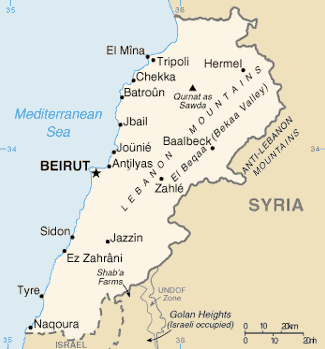In UnHerd, Tom McTague explains why there can be no “settlement” of the South Lebanon problem, because Lebanon ceased functioning as an independent state and is now largely controlled by Hezbollah, which means it’s indirectly controlled by Iran:
[…] A similar assessment was made about Lebanon, a country without a functioning state or economy and at the mercy of Iran’s colonial army, Hezbollah. This, also, was a situation that was thought to be containable — even as Iran exploited the anarchic chaos of Iraq and Syria to supply its proxy with enough weapons to devastate Israel.
The central conceit of the Abraham Accords was that, irrespective of Hamas, Hezbollah and the occupation of the West Bank, once the Israel-Saudi axis was formed, Iran could be pushed back and contained without direct American involvement. But, then, the depth of Hamas’s murderous brutality on 7 October shattered that assumption, leaving not only a traumatised and vulnerable Israel, but also a traumatised and vulnerable Western order forced to confront the stark realities of the Middle East.
Today, Lebanon is a dead state, eaten alive by Hezbollah’s parasitic power. The scale of the catastrophe in the country is hard to comprehend, much of it caused by the disruptive nature of Syria’s civil war. Since its neighbour’s descent into anarchic hell, some 1.5 million Syrians have sought refuge in Lebanon — a tiny country with a population of just 5 million. But, more fundamentally, with Hezbollah fighting to protect Bashar al Assad, the opposing countries — led by Saudi Arabia — began withdrawing funds from Lebanese banks. This sparked a financial crisis that left Lebanon with no money for fuel.
By spring 2020, the country had defaulted on its debts, sending it into a downward spiral which the World Bank in 2021 described as among “the top 10, possibly top three, most severe crises globally since the mid-nineteenth century”. Lebanon’s GDP plummeted by around a third, with poverty doubling from 42% to 82% in two years. At the same time, the country’s capital, Beirut, was hit by an extraordinary explosion at its port, leaving more than 300,000 homeless. By 2023 the IMF described the situation as “very dangerous” and the US was warning that the collapse of the Lebanese state was “a real possibility”.
With Iranian support, however, Hezbollah created a shadow economy almost entirely separate from this wider collapse. It could escape the energy shortages, while creating its own banks, supermarkets and electricity network. Hezbollah isn’t just a terrorist group. It is a state within a state, complete with a far more advanced army. “They may have plunged Lebanon into complete chaos, but they themselves are not chaotic at all,” as Carmit Valensi, from the Institute for National Security Studies at Tel Aviv University, told the Jerusalem Post.
Then came 7 October, after which Hezbollah tied its fate to that of the Palestinians, promising to bombard Israel with rockets until the war in Gaza was brought to a close. We have witnessed the frightening scale of its power over the past year, its bombardment forcing some 100,000 Israelis from their homes in Galilee to the safety of the Israeli heartlands around Tel Aviv. For the first time since modern Israel’s creation, the land where Jews are able to live in their own state has shrunk; the rockets are a daily reminder of the country’s extraordinary vulnerability, threatened on all sides by states who actively want it removed from the map — even from history itself. The pretence that the Palestinian and Lebanese questions could be contained, ignored or bypassed as part of a wider grand strategy to contain Iran has been shattered.




